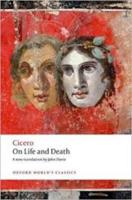
OUP (2017) p/b 251pp £9.99 (ISBN 9780199644148)
This addition to the Oxford ‘World’s Classics’ Series contains three very accessible philosophical works from the final two years of Cicero’s life: Tusculan Disputations, On Old Age and On Friendship. Two letters from Cicero’s extensive collection, one from Cicero to Gaius Matius and Matius’ subsequent reply, written during the same period and concerning their friendship, are also included as an interesting appendix.
D.’s accurate, lucid and readable translation is accompanied and framed by a most informative introduction and notes by Miriam Griffin. G.’s introduction covers Cicero’s political career as well as his philosophical writings and explains his motivation for the latter. Each of the three works is prefaced by a synopsis; a chronology of Cicero’s life and a select bibliography complete the volume.
Tusculan Disputations was addressed to an unspecified young person and was probably written in response to the death of Cicero’s beloved daughter, Tullia, although some commentators believe that his despair in 45 BC at Caesar’s dictatorship was the main motivation. His avowed intention was to present well-written philosophy in Latin, encompassing the views of the great Greek philosophers, but adding Roman morality and wisdom: ‘… my conviction has always been that our forefathers have shown more wisdom than the Greeks, either in making their own discoveries or in improving upon what they took from them…’. He created a dramatic vehicle in five books, representing five days of discussions, with some parts written as a Socratic dialogue. Later scribes added ‘A’ and ‘M’ to represent the interlocutors, and D. retains these in his translation. The topics addressed are death, pain, distress, the role of rational argument as a cure for such evils, and the search for happiness. Cicero debates and amplifies the views of a wide range of Greek philosophers, adding his own thoughts and interpretations. At the end he makes it clear that he has produced this work to help him to endure his own sorrows.
Much of On Old Age is still relevant today, as we come to terms with increased longevity. Cicero used Cato the Elder, then aged 83, as his mouthpiece in this work, in a staged discussion with Laelius and Scipio. He points out that: ‘the racetrack of life is fixed, and nature has only one path, which is run once only: and each part of life has been given its own appropriate quality…’. An old man is compared to the helmsman of a ship, who may not run around in the manner of the rest of the crew, but who plays a vital part in the voyage. He also points out how successful and content many elderly farmers are. Cato explains that he is glad to be rid of the ‘cruel master’, as Sophocles described sexual impulses, but can still enjoy conversation and dining moderately with friends. In his closing remarks he comments that old age is no burden to him, but a source of pleasure.
The final treatise in this volume is On Friendship. This time Laelius is the main speaker, in conversation with two of his sons-in-law. His view is clear: ‘For friendship is nothing other than a shared set of views on all matters human and divine, together, with goodwill and affection,…with the exception of wisdom, it is the greatest gift bestowed on man by the immortal gods.’ This is supported in the ensuing text by many specific examples, mainly drawn from Roman history, and Laelius concludes that nothing other than virtue is finer than friendship.
This book provides much thought-provoking material and serves as an excellent introduction to a different side of Cicero for those who are only familiar with his oratorical works and political manoeuvrings. It will appeal both to those who are already well-versed in philosophy and to those who come new to this discipline.
Marion Gibbs
